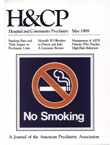Management of HIV-Positive Psychiatric Patients Who Fail to Reduce High-Risk Behaviors
Abstract
The authors describe clinical and legal dilemmas faced by staff involved in providing inpatient psychiatric treatment to two HIV carriers who continued to practice high-risk behaviors after learning of their HIV infection. Staff were unsure of their obligation to report the patients under a state law giving the commissioner of health broad discretion to limit the freedoms of HIV-infected individuals who continue to practice high-risk behaviors. Treatment of the patients also raised concerns about the appropriateness of treating noncompliant HIV-infected patients in traditional psychiatric settings and the lack of suitable aftercare facilities. The authors advocate developing a specialized treatment approach for noncompliant HIV-infected patients and provide a series of recommendations that might serve as the foundation for such an effort.
Access content
To read the fulltext, please use one of the options below to sign in or purchase access.- Personal login
- Institutional Login
- Sign in via OpenAthens
- Register for access
-
Please login/register if you wish to pair your device and check access availability.
Not a subscriber?
PsychiatryOnline subscription options offer access to the DSM-5 library, books, journals, CME, and patient resources. This all-in-one virtual library provides psychiatrists and mental health professionals with key resources for diagnosis, treatment, research, and professional development.
Need more help? PsychiatryOnline Customer Service may be reached by emailing [email protected] or by calling 800-368-5777 (in the U.S.) or 703-907-7322 (outside the U.S.).



